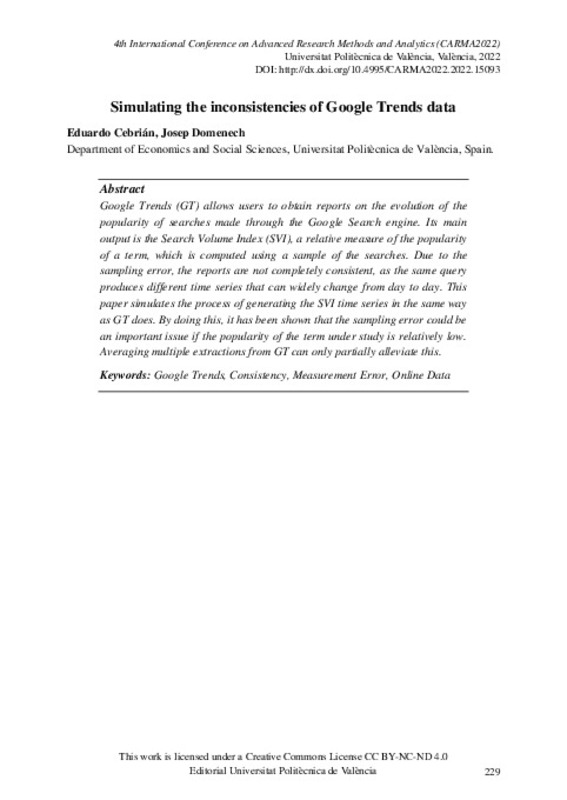JavaScript is disabled for your browser. Some features of this site may not work without it.
Buscar en RiuNet
Listar
Mi cuenta
Estadísticas
Ayuda RiuNet
Admin. UPV
Simulating the inconsistencies of Google Trends data
Mostrar el registro sencillo del ítem
Ficheros en el ítem
| dc.contributor.author | Cebrián, Eduardo
|
es_ES |
| dc.contributor.author | Doménech i de Soria, Josep
|
es_ES |
| dc.date.accessioned | 2022-11-10T12:15:56Z | |
| dc.date.available | 2022-11-10T12:15:56Z | |
| dc.date.issued | 2022-09-20 | |
| dc.identifier.isbn | 9788413960180 | |
| dc.identifier.uri | http://hdl.handle.net/10251/189564 | |
| dc.description.abstract | [EN] Google Trends (GT) allows users to obtain reports of the evolution of the popularity of searchers made through the Google Search engine. Its main output is the Search Volume Index (SVI), a relative measure of the popularity of a term, which is computed using a sample of the searches. Due to the sampling error, the reports are not completely consistent, as the same query produces different time series that can widely change from day to day. This paper simulates the process of generating the SVI time series in the same way as GT does. By doing this, it has been shown that the sampling error could be an important issue if the popularity of the term under study is relatively low. Averaging multiple extractions from GT can only partially alleviate this. | es_ES |
| dc.description.sponsorship | This work was partially supported by grants PID2019-107765RB-I00 and funded by MCIN/AEI/10.13039/501100011033. | es_ES |
| dc.format.extent | 7 | es_ES |
| dc.language | Inglés | es_ES |
| dc.publisher | Editorial Universitat Politècnica de València | es_ES |
| dc.relation.ispartof | 4th International Conference on Advanced Research Methods and Analytics (CARMA 2022) | |
| dc.rights | Reconocimiento - No comercial - Sin obra derivada (by-nc-nd) | es_ES |
| dc.subject | Google Trends | es_ES |
| dc.subject | Consistency | es_ES |
| dc.subject | Measurement Error | es_ES |
| dc.subject | Online data | es_ES |
| dc.title | Simulating the inconsistencies of Google Trends data | es_ES |
| dc.type | Capítulo de libro | es_ES |
| dc.type | Comunicación en congreso | es_ES |
| dc.identifier.doi | 10.4995/CARMA2022.2022.15093 | |
| dc.relation.projectID | info:eu-repo/grantAgreement/AEI/Plan Estatal de Investigación Científica y Técnica y de Innovación 2017-2020/PID2019-107765RB-I00/ES/HUELLA DIGITAL, COMPETITIVIDAD Y DEMOGRAFIA EMPRESARIAL/ | es_ES |
| dc.rights.accessRights | Abierto | es_ES |
| dc.contributor.affiliation | Universitat Politècnica de València. Facultad de Administración y Dirección de Empresas - Facultat d'Administració i Direcció d'Empreses | es_ES |
| dc.contributor.affiliation | Universitat Politècnica de València. Departamento de Economía y Ciencias Sociales - Departament d'Economia i Ciències Socials | es_ES |
| dc.description.bibliographicCitation | Cebrián, E.; Doménech I De Soria, J. (2022). Simulating the inconsistencies of Google Trends data. En 4th International Conference on Advanced Research Methods and Analytics (CARMA 2022). Editorial Universitat Politècnica de València. 229-235. https://doi.org/10.4995/CARMA2022.2022.15093 | es_ES |
| dc.description.accrualMethod | OCS | es_ES |
| dc.relation.conferencename | CARMA 2022 - 4th International Conference on Advanced Research Methods and Analytics | es_ES |
| dc.relation.conferencedate | Junio 29-Julio 01, 2022 | es_ES |
| dc.relation.conferenceplace | Valencia, España | |
| dc.relation.publisherversion | http://ocs.editorial.upv.es/index.php/CARMA/CARMA2022/paper/view/15093 | es_ES |
| dc.description.upvformatpinicio | 229 | es_ES |
| dc.description.upvformatpfin | 235 | es_ES |
| dc.type.version | info:eu-repo/semantics/publishedVersion | es_ES |
| dc.relation.pasarela | OCS\15093 | es_ES |
| dc.contributor.funder | Agencia Estatal de Investigación | es_ES |








